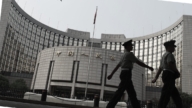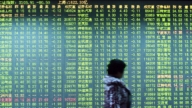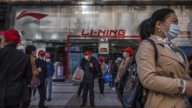【新唐人2013年06月29日訊】在央行6月25號發佈的一份安撫聲明,驅散投資者對於中國銀行同業借貸市場流動性缺乏的擔憂之後,中國股市停止了暴跌,中國銀行同業拆息從超過20%下降到大約6%。但是,許多問題仍然存在,包括甚麼是這場金融動盪的原因?央行打壓地下銀行的做法將給疲軟的經濟雪上加霜嗎?
對於是甚麼原因造成最近中國銀行同業拆借市場的緊張,有許多人猜測是央行故意設計了一場人為的信貸緊縮,以打擊中國地下銀行領域,遏制中國信貸泡沫的膨脹。但是美國《財富》雜誌6月27號發表美國政治學家裴敏欣的評論認為,這場金融動盪並非央行有意設計,而是一個長期形成的問題突然爆發,而中共貨幣部門對此手足無措。
「北京大學」經濟學教授夏業良也認同這種觀點。
北京大學經濟學教授夏業良:「這個雖然講(央行)有讓銀行各負其責的這樣一個壓力,但實際上並不是說央行一開始設計好讓它們往裡面鑽的。而是到了目前這個地步以後,央行現在一方面它要嘛就是救,救這個商業銀行,實際上它也救不了,它要巨額的天文般的數字才能救。另一方面它就是要求各負其責,要銀行自己承擔這樣一個風險。我覺得這樣做是對的。」
夏業良指出,這場資金緊縮的爆發,一個是銀行體系本身放貸過多,銀行本身也缺乏足夠的約束,所以資本金準備也不充分,造成現金流動性虛弱。如果遇到大規模提款的話,它就沒有辦法應付。
夏業良:「其實這個錢都到哪兒去了?都是鋪攤子去了。搞那些幾萬億的工程,面子工程,各行各業都在大興土木搞建設。那錢暫時收不回來,有的項目本身就是失敗的項目,所以錢就沒有辦法收回來。現在同行之間互相拆借資金,誰拿到現金就覺得可以讓企業活起來,或者讓銀行自身保持地位不變,所以拆借利率可以達到百分之十幾,甚至百分之二十,這簡直是一種非理性的自殺行為,對銀行來說。」
夏業良指出,中國經濟現在積聚各種風險,有很多長期以來沒有解決的結構性矛盾和問題,到一定時點上都會爆發出來。
夏業良:「比如通貨膨脹問題,比如說因為人民幣升值造成倒逼貨幣超量發行,這樣一些問題,包括最近的錢荒,都是金融體系缺乏系統性的制度約束所造成的。現在很難說金融危機在甚麼時點上爆發。反正現在有很多的危機,包括房地產泡沫,還有對外貿易方面,出口本來就是減少,另一方面銀行本身,本來是想通過上市以後實現現代公司企業治理制度能夠得到提升,但是現在來看,只是有了這個形式,有了外部這個殼,但是內涵還是沒有。這裡邊就存在很大隱患和風險。」
北京「天則經濟研究所」副所長馮興元認為,地下銀行本身之所以在中國蓬勃發展,是市場對政府管制的反抗。如果政府單純打擊地下銀行,而不是進行結構改革,中國經濟將會受到打擊。
北京天則經濟研究所副所長馮興元:「你可以看到整個政策還是行政調控,這樣的話,市場主體包括銀行,它肯定要轉向表(資產負債表)外業務向需求主體提供融資。包括社會上的資金也需要出路。這樣的話,像信託,銀行界的債券市場,銀行間拆借,是非常活躍。它是一種市場對政府管制的自然反應。所以如果它還要打壓影子銀行的話,那實際上整個經濟就被他打壓了。」
《紐約時報》6月27號評論說,即使中共領導人習近平能夠成功的推動這些相當艱鉅的經濟改革措施,中國的經濟增長,可能也會比普遍預期慢。
採訪編輯/秦雪 後製/周天
Political Factors Overshadow China’s recent Financial Turmoil
A Fortune article wrote that, Chinese stock markets halted
their plunge on 25th June after China’s central bank issued
a reassuring statement to dispel investors’ worries
about the lack of liquidity in China’s interbank loan markets.
The rates of China’s interbank loans also fell from
over 20% to around 6%.
However, many questioned remain to be answered.
What are the causes of this financial turmoil?
Will the crackdown on shadow banks make
China’s economy even worse?
There are many theories about the recent seizing-up of
China’s interbank loan market.
Many speculate that China’s central bank have engineered
an artificial credit squeeze to crack down on China’s shadow
banking sector, such as to prevent the bursting of
the credit bubble.
However, American political scientists Minxin Pei published
an analysis article in Fortune magazine on 27th June which
presents another theory.
Pei believes that, rather than being plotted by China’s
central bank, the incident is most likely a botched response
by the Chinese monetary authorities to a problem that
has been long been in the making but exploded without
warning and caught them completely by surprise.
Xia Yeliang, a professor of economics at Peking University,
agrees with Pei’s theory.
Xia Yeliang, professor of economics at Peking University:
“Although the central bank now pressures the banks by
making them responsible for their own business,
this was not artificially plotted from the very beginning.
The central bank simply requires all the banks to take
their own risks as the situation has become so bad.
I think this is the right move.”
Xia Yeliang remarked that, one of the causes of
the credit squeeze was over-lending by the bank system.
As the bank industry is not well regulated in China,
it didn’t stock enough capitals to support the
lending magnitude and thus resulted in a weak cash flow.
Therefore the banks will fail to respond if a large scale
of cash withdrawals were requested.
Xia Yeliang: “Where has the money gone?
It was used to put up rash establishments, such as image
projects that may cost as much as a trillion Yuan.
Almost every industry is doing the same thing.
As many projects have failed, the banks cannot
get the money back.
Now the banks are borrowing money from each other.
They feel that the cash can vitalize the business which is
necessary to keep their reputation, and the lending rate
has increased to over 10% or even 20%.
For banks this is definitely a crazy move
that results in their killing themselves.”
Xia Yeliang said, many risks have been stored in
China’s economy; there are many structural problems
that have not been solved for a long time;
all of these will break out at a certain time.
Xia Yeliang: “There is an inflation problem.
There is also excess monetary growth forced
by RMB appreciation.
Recently there has been a cash flow problem.
All this results from the lack of systematic regulations
of the bank system.
Currently it is still hard to tell when
the financial crisis will break out.
But we know there are many of them, such as the real
estate bubble and the dropping of foreign trade.
Talking about Chinese banks, they have been expected
to adopt modern management systems after coming onto the market.
But now we see that the changes are only superficial and
not completely structural.
There is really a hidden danger and big risks behind this.”
Feng Xingyuan, vice director of Beijing Tianze Research
Institution of Economics,
said the prosperity of shadow banks itself is a
resistance to the party’s administrative control.
If the authority simply suppresses shadow banks
without making any structural reform, China’s economy will be greatly damaged.
Feng Xingyuan: “You can see that the party’s policy is still
largely some kind of administrative control.
Therefore the majority of the market, including the banks,
will inevitably provide loans to off-balance sheet business.
The situation is similar for free money in society.
This leads to prosperity of a trust company,
interbank bond markets and loans.
This is the natural market response
to the administrative control.
Therefore if the authority insists on cracking-down on shadow
banks, it will in fact suppress the whole economy.”
A New York Times article on 27th June wrote that,
Even if Mr Xi succeeds in pushing through ambitious
economic reform packages, as we should assume he will,
growth in China is likely to be slower than
the consensus of expectations.





























